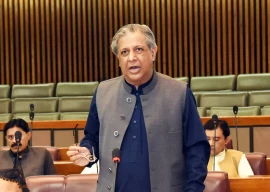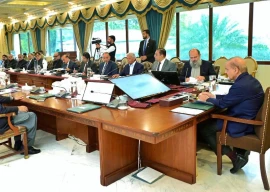
ISLAMABAD: The 21st Constitutional Amendment, under which military courts were set up for the speedy trial of ‘jet black terrorists’, may have been a bitter pill for many in the opposition but it is perhaps the only historic step parliament took when it comes to legislation in 2015.
Senator Raza Rabbani, now the Senate chairman, burst into tears – a rare scene to witness from the press gallery of parliament – when the amendment was passed. But the argument was that extraordinary circumstances required extraordinary measures.

2015 started with the wounds of the Army Public School massacre still fresh. This was reflected in proceedings of the National Assembly as debate on the attack was on the agenda for January 1.
Soon afterwards, ‘brotherly’ Saudi Arabia sought to enlist Islamabad for intervention in Yemen. The decision was not an easy one given the relations between the two but the government convened a joint session of parliament, the first for the year, so that any step take would be owned by all political forces of the country.
The somber atmosphere of parliament changed a week later when China’s President Xi Jinping addressed a joint sitting on April 21. Though absenteeism would mar many of the year’s proceedings, legislators did not miss the address of the Chinese president.
Ministers spent most of their time out of parliament in 2015, shifting all responsibilities to State Minister for Parliamentary Affairs Sheikh Aftab Ahmed who was there to respond to queries on everything from space technology to mundane issues.
NA did not meet for a record period during the year from August 13 to November 6, perhaps because Speaker Sardar Ayaz Sadiq was shown the door by an election tribunal. The government did not convene a session until he was elected again.
On the other hand, the Senate changed dramatically after Raza Rabbani took over as chairman. Rabbani took a number of initiatives, the first and foremost of which is the observance of time. He also took notice of ministers’ absenteeism, warning them that they will be barred from the house if they skip on proceedings. The Senate also introduced public petition for the first time.
The government issued many ordinances during the year, the most recent and controversial of which is the PIA Corporation Conversion Ordinance. To the ire of the opposition, this decree was introduced at a time when a National Assembly had already been summoned.
The lower house passed 24 bills in 2015; the government introduced 25 bills and MNAs presented 30 bills before the house. Eleven ordinances were also laid before the National Assembly. In Senate, private members introduced nine bills and government introduced 14 bills. The upper house also passed 28 resolutions during 2015.
Published in The Express Tribune, January 1st, 2016.

































































COMMENTS
Comments are moderated and generally will be posted if they are on-topic and not abusive.
For more information, please see our Comments FAQ